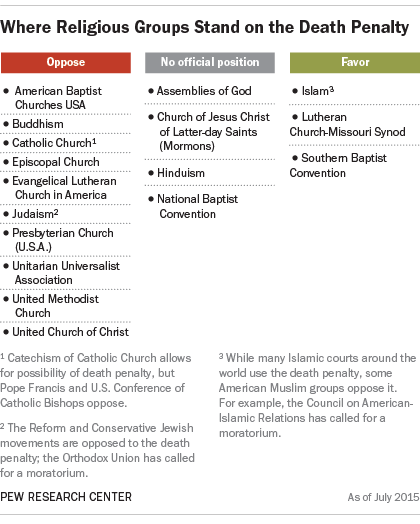The weekly report on research and demographics of the secular movement
by Julie Esris
In late May 2015, the conservative state of Nebraska unexpectedly made the news when it abolished the death penalty after a bill pushed by Nebraskan atheist senator Ernie Chambers became law. Defying the wishes of Republican governor Pete Ricketts, the legislature voted 30-19 to abolish capital punishment, making Nebraska the first conservative state in over forty years to do so. However, the death penalty is as a divisive issue as ever. Proponents have varying reasons for supporting the death penalty, such as believing that it deters would-be murderers or giving murder victimsÔÇÖ families peace of mind. OpponentsÔÇÖ reasons for being against the death penalty may include believing that it is not a deterrent and that it does not make the world safer.
Although support for the death penalty has dropped, a majority of Americans still favor it (56%). A 2015 pew poll reveals that religion factors somewhat as to whether or not one supports the death penalty, but there is a disparity between official beliefs of a particular denomination and individual beliefs of its adherents. This disparity is primarily among mainline Protestants. A majority (66%) of white Protestants support the death penalty. However, the official position of many Protestant churchesÔÇöUnited Methodist Church, Evangelical Lutheran Church, American Baptist Churches, the Presbyterian Church, and several othersÔÇöis that the death penalty is immoral. There is also a disparity between individual Catholics and the official position of the Catholic Church in terms of capital punishment. 53% of individual Catholics support it, but the Church officially opposes it.
On the other hand, 71% of evangelical Protestants support capital punishment, in accordance with their churches, such as the Southern Baptist Convention and the Lutheran Church-Missouri Synod. There are also churches that do not take an official stance on the death penalty, including the Mormon Church, the Assemblies of God, and the Northern Baptist Convention.
Reform and Conservative Jewish denominations are largely against the death penalty, and the Orthodox Union has called for a moratorium. Buddhism has no official stance, but most Buddhists are against the death penalty. The Islamic world widely supports capital punishment, although many American Muslim groups are speaking out against it. Hinduism does not have a clear stance on the death penalty. Religiously unaffiliated AmericansÔÇöagnostics, atheists, and those who say their religion is ÔÇ£nothing in particularÔÇØÔÇöare almost equally split, with 48% in favor and 45% opposed.
The question arises as to how religion is relevant to oneÔÇÖs stance on the death penalty. It is obvious that religion does have some influence on individualsÔÇÖ support or condemnation of it, but clearly not a heavy one, as many people do not agree with the position that their religious denomination officially takes. It is unsurprising that of the Christian religions surveyed, Catholics are less likely to support capital punishment. Other polls analyzed for Secular Policy Institute have consistently shown that Catholics tend to take a more liberal stance on social issues than their Protestant counterparts. Equally unsurprising is that Jews are less likely to be in favor of the death penalty (although this poll, unfortunately, did not provide any numbers for this statistic), as they tend to hold more liberal positions on a variety of issues. Many Muslims support the death penalty (again, no numbers), unsurprising since many Islamic countries hand it down quite liberally, but it is also important to realize that many Muslim groups in America actively oppose it.
The unaffiliated are less likely than their religious counterparts to support the death penalty. This is possibly due to the fact that the unaffiliatedÔÇöespecially those who explicitly identify as atheist or agnosticÔÇöare generally more liberal. Additionally, not belonging to a religion means that there is no holy book to influence their position. For some individual atheists and agnostics, their stance could simply be borne out of distaste for religion in general, with holy books such as the Bible and the Koran specifically supporting the death penalty, often for trivial ÔÇ£crimesÔÇØ (adultery), and carried out in gruesome ways (stoning).
Capital punishment is and will continue to be a contentious, divisive topic in the United States, but NebraskaÔÇÖs abolishment of the practice as well as an overall decline in support for it among Americans strongly suggests that America is heading in a more liberal and secular direction. However, it is also important to realize that this Pew study does not provide enough information to address this issue more thoroughly. It focuses on the positions of Christian denominations and their adherents while only making passing referencesÔÇöwithout numbersÔÇöto those of other religious groups. A more thorough study by the Pew Research Center or some other research organization is needed.
